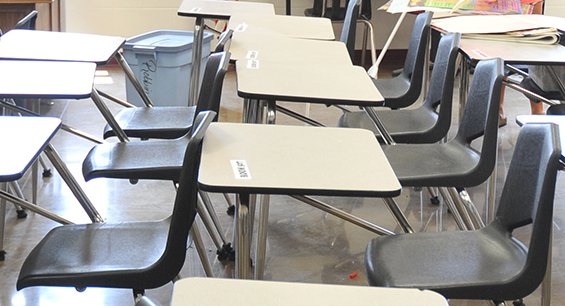Efforts to raise teacher salaries in 74 of the state's school districts and charter school systems are underway after lawmakers created the Teacher Salary Equalization Fund earlier this year.
The Arkansas Division of Elementary and Secondary Education has notified the districts and charter systems of their preliminary allocations from the new fund. Those range from $6,943 for the Hope Academy, a charter school in Bentonville, to $957,244 for the Russellville School District.
[DOCUMENT: Districts eligible for TSEF money » arkansasonline.com/427salary/]
All but two of the state's 24 public charter school systems are to receive money from the new fund, as are 52, or 22%, of the state's 238 traditional districts.
There are two qualifiers for the equalization funding, which is made possible by Acts 679 and 680 of this year's legislative session.
For one, the districts have to be paying less than the state's average teacher salary. Secondly, they can't be recipients of the Education Compensation Reform Program.
Charter schools are not eligible for the Education Compensation Reform Program, which helps districts meet the state's minimum teacher salary requirements.
[DOCUMENT: Act 679 of 2021 » arkansasonline.com/427act679/]
"The funding continues the commitment by the governor and the General Assembly to invest in Arkansas teachers and to create a funding stream dedicated to salary increases," Ivy Pfeffer, deputy commissioner in the Elementary and Secondary Education Division, said about the equalizing money.
[DOCUMENT: Act 680 of 2021 » arkansasonline.com/427act680/]
Pfeffer said the new fund also addresses two deficiencies cited more than a decade ago by the Arkansas Supreme Court in what was known as the Lake View school funding case. Those are "disparities in salaries within the state and low salaries compared with other states."
"The legislation provides an ongoing way to address these," she said.
For the 2021-22 and 2022-23 school years, the Arkansas General Assembly has identified the targeted average annual salary as being $51,822.
Once identified as falling under that targeted average salary and otherwise eligible for the funding, a district or charter system's allocation from the Teacher Salary Equalization Fund is calculated by multiplying $185 by the district's average student enrollment from the previous school year.
Teacher Salary Equalization Fund resources are to be spent only for teacher salaries and benefits, according to the state agency memorandum that was distributed with the list of districts eligible for funding.
Some of the districts scheduled to receive the money are close to the targeted annual average.
The West Memphis School District's average salary is $51,018, according to the state agency list, and it is to receive $933,795. Russellville's average salary is $50,782.
The Alma School District is projected to receive $595,672. It has an average salary of $51,735, which is the highest average salary that is below the target.
"We were surprised that we made the funding cut on this," Superintendent David Woolly said Monday. "We thought that our average salary was about $450 above the target. It turned out that we were about $85 below the target. We had failed to subtract the state funding for National Board-certified teachers, as the law specifies. We have about 25 such teachers, which at $5,000 each put us under the target."
Decisions are still to be made about how to distribute the money, Woolly said.
"Certainly all of it will go to teachers," he said in an email. "Probably we will increase our base salary, and also increase the amount for graduate work, and increase the amount of the annual step increase. The balance between those three is still under discussion."
Woolly said the money is needed as salaries in west and Northwest Arkansas are competitive.
"Although our salary for a beginning teacher is one of the highest in the area, we are not as competitive for teachers with advanced degrees and several years of service. This will help get us among the upper echelon in these calculations. We all are interested in employing the best teachers, and this will help us."
Other districts and charter systems are further away from the $51,822 targeted average.
The Genoa Central district's average salary is listed at $33,891. The district is to receive $214,812.
The tiny Imboden Area Charter School, with a listed average salary of $38,844, has an allocation of $11,734 from the Teacher Salary Equalization Fund.
Bryan Duffie, superintendent of the Jacksonville/North Pulaski School District, said the allocation of $689,280 to his 3,800-student system is roughly what he expected. He is now waiting for guidance or rules from the state on how the money can be distributed -- whether it must be applied to the teacher salary schedule or can be distributed in other ways.
The School Board for the district has already approved $1,000 across-the-board raises for teachers for the upcoming 2021-22 school year. The raise, paired with the traditional step increase for an additional year of experience, will provide a $1,550 increase for teachers. Duffie said the new funding will help pay for the increases.
The Jacksonville district, which began operations in 2016 after it was carved out of the Pulaski County Special School District, has a high percentage of young teachers who have not reached the high end of the salary scale. That results in a lower average salary for the district.
"This will definitely help Jacksonville compete with neighboring districts on teacher salaries and help get the average up," Duffie said Monday about the equalizing funds this year and into the future. "From what I understand, the intent is this will be a permanent categorical fund."
